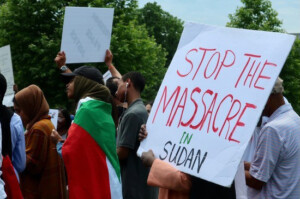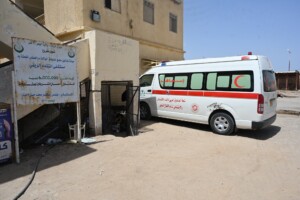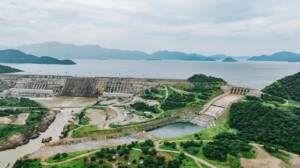Torrential rains in Sudan leave 79 dead, more than 50,000 homes damaged
The number of people killed by the torrential rains that have swept through large parts of Sudan since the beginning of this month has risen to 79. More than 50,000 houses collapsed completely or partially in the country, according to the latest reports. The Darfur camps for the displaced have been hit hard as well, but are still waiting for assistance. The United Arab Emirates (UAE) and Qatar will send aid to Sudan.
 Entire villages are flooded in El Managil in El Gezira, August 18 (Social media)
Entire villages are flooded in El Managil in El Gezira, August 18 (Social media)
The number of people killed by the torrential rains that have swept through large parts of Sudan since the beginning of this month has risen to 79. More than 50,000 houses collapsed completely or partially in the country, according to the latest reports. The Darfur camps for the displaced have been hit hard as well, but are still waiting for assistance. South Darfur has been declared a disaster area. The United Arab Emirates (UAE) and Qatar will send aid to Sudan.
Most of Sudan’s 18 states have been affected by the heavy rains. In El Gezira, floods broke roads and isolated entire villages in El Gezira. Many agricultural areas have been inundated as well.
At least 79 people have been killed. Abdeljalil Abdelrahim, spokesperson for the National Council for Civil Defence, said on Saturday. An estimated 50,000 houses collapsed completely or partially.
On the basis of info from humanitarian organisations on the ground and local authorities, the government’s Humanitarian Aid Commission (HAC) estimated that by August 14, about 136,000 Sudanese have been affected by heavy rains and floods since May. More than 8,900 houses were destroyed. Another 20,600 were damaged.
The UN Office for the Coordination of Humanitarian Affairs (OCHA) in Sudan reported last Sunday that the number of people and localities affected by rains and floods this year may double in comparison with former years.
The 2022 Sudan Emergency Response Plan (ERP) has predicted that more than 460,000 people could be affected by floods this rainy season. Between 2017 and 2021, an average of 388,600 people were affected annually.
The most affected regions are Darfur, northern Sudan, Kordofan, and Sennar and Kassala in eastern Sudan, OCHA reported.
The rainy season in the southern parts of Sudan usually starts in May, and reaches Khartoum in June-July. It lasts up to September, with the peak of rains and flooding observed between August and September in the past years.
Flooding occurs every year in Sudan. Apart from destroying buildings, crops, and land, the swollen rivers and pools of standing water increase the risk of water-borne disease such as malaria, acute watery diarrhoea, and cholera.
Darfur camps
Yagoub Furi, General Coordinator of the Darfur Displaced People and Refugees reported on Thursday that an estimated 7,000 homes, health centres and schools were entirely or partially destroyed in the camps for the displaced. In particular South Darfur has been hit hard.
He said in a statement on Thursday that about 1,000 homes in the camps in Kass were damaged to various degrees. Three camp residents drowned when they tried to cross a flooded wadi.
Furi in particular expressed his concern over the health effects of the stagnant water pools in Kalma camp near the South Darfur capital of Nyala, where more than 100,000 people live.
Emergency committees have been set up by the Darfur state governments to coordinate humanitarian aid during the rainy season. Furi told the Sudanese Ayin Network that “government intervention has been limited only to affected towns and villages, bypassing the camps for the displaced [..] which are the most fragile areas and need urgent intervention”.
On Friday, the Sudan High Emergency Committee declared South Darfur a "disaster area," Darfur24 reported.
Support
The deputy head of the Sovereignty Council, Gen Mohamed ‘Hemeti’ Dagalo, visited people affected by the rains in Berber, River Nile state, last week. He was accompanied by the ministers of Finance and Health, and representatives of Sudan’s Humanitarian Aid Commission, the Sudanese News Agency (SUNA) reported.
Hemeti pledged the federal government’s support to the people of Berber, stating that mining areas in the country were first found in River Nile state. These areas will receive their full share of social responsibility, he said.
He told them that a large convoy containing shelter materials and foodstuffs would be sent soon to Berber, as well as a medical delegation. He also promised them that they would receive compensation for their losses.
In Khartoum, the Council of Ministers developed a plan to mobilise international and regional support. In a meeting on Wednesday, the Council’s technical committee discussed practical steps for this plan.
SUNA reported yesterday that the President of the United Arab Emirates (UAE), Sheikh Mohamed bin Zayed, informed Gen Abdelfattah El Burhan, head of Sudan’s Sovereignty Council, that his country will send urgent assistance.
This morning, two Qatari aeroplanes carrying relief materials would arrive at Khartoum International Airport, Qatari Ambassador Abdulrahman Al Kubaisi in Sudan stated yesterday. He said that the shelter and food items would be distributed among the affected in El Gezira and River Nile states by technical field teams of the Qatar Charity Foundation.
In the past week, several Sudanese social media activists have expressed their frustration about the lack of support by the Sudanese army and the paramilitary Rapid Support Forces.
One of them tweeted that “When disasters occur, armies all over the world come down to ward them off, but it seems that our army itself is a disaster that needs to be warded off.”
Journalist Dalia El Tahir referred to the World Humanitarian Day on Friday, and tweeted: “What should the people of El Gezira do to attract the attention of the militia government, after their homes were destroyed and are spending the nights in the open? They are living in tragic conditions without finding any support or assistance.”
She reported yesterday that the Medical Students Association is collecting funds to send an aid convoy accompanied by medics to El Gezira.











 and then
and then